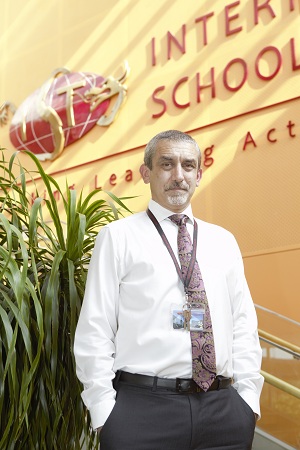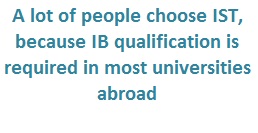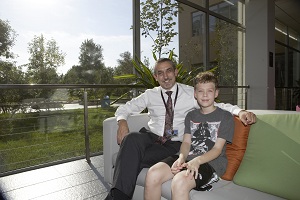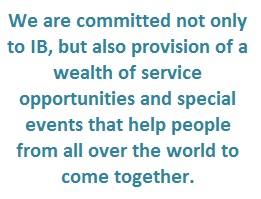Focusing on Unique Needs of Students:
Key to International Education
An exclusive interview with Steve Moody,
Director of the International School of Tianjin
By Nadia N.
 Steve Moody is the Director of the International School of Tianjin. He has been living and working in education in China for the past 20 years. Although Steve Moody has been the school’s director for many years, he maintains an appreciation of the changing needs of the international community and students and the nuances of international education. As an expatriate, Steve sees Tianjin and China developing and changing through the prism of the international school system.
Steve Moody is the Director of the International School of Tianjin. He has been living and working in education in China for the past 20 years. Although Steve Moody has been the school’s director for many years, he maintains an appreciation of the changing needs of the international community and students and the nuances of international education. As an expatriate, Steve sees Tianjin and China developing and changing through the prism of the international school system.
Business Tianjin spoke to Steve Moody exclusively about some of the distinctive features of international education at IST, fine points of international education, and further development.
You have been living in Tianjin for 20 years already. What keeps you in China for such a long period of time?
China is certainly very different to our home in New Zealand, although my family has always felt welcome, safe and comfortable here in Tianjin. My wife Jo and I came to China in 1996, and, coincidentally, this year we celebrate our 20th or ‘China’ anniversary! Tianjin has blessed us with many new friends and unique opportunities and challenges. Tianjin has definitely matured and developed as a world city during our time here, as has the international community, and along with it our school. We have been away from NZ for a long time, but Tianjin’s transformation and the changes that we have witnessed keep us enthused. Change keeps us all on our toes and certainly helps inspire me to work towards ensuring that our school continues to evolve and improve to meet the needs of the community. Helping to keep us here is the fact that our daughters were born in Tianjin, and it is home to them too.
IST is one of the schools in Tianjin authorized by IB. What are the advantages of this programme for children and their parents?
IST is the only three-programme IB (International Baccalaureate) school in Tianjin, providing the full continuum of learning from pre-school through to graduation and the IB Diploma. The IB programmes are not aligned with any single national system; rather, they are a synthesis of research and best practices from a range of national systems and the shared experiences of international schools. IB programmes embrace challenging, significant and globally relevant content while also providing students with a balanced and transferable set of skills and dispositions for academic and personal success. The programmes are specifically designed to support ease of transfer between school systems, something of major concern for families living abroad. There are more than 4,000 IB schools, in over 150 countries, so parents can be sure that their child's unique learning needs will be met and that their education can be successfully continued upon relocation. IST’s graduation qualification, the IB Diploma, is highly respected and regarded as the world’s premier and most globally recognised university admission qualification.
There are several international schools in Tianjin. What are IST's specialties in terms of environment, philosophy and teaching?
The basis of our philosophy is a belief that IST is a friendly place, where the needs of the students come first, and in spite of our growth from a small, fledging primary school to a leading and regionally accredited Nursery through Grade 12 IB World School, we continue to strive to support the values of a welcoming and community oriented school. Schools should not be sausage factories because students are not sausages; they are individuals with unique qualities and needs. It is therefore our responsibility to acknowledge and celebrate each individual learner and to tailor our learning programmes in ways that ensure that individual students are at the heart of all that we do, rather than run them through the sausage machine.
As an IB school we are also deeply committed to inquiry based learning, and to helping students learn to think creatively and critically, to make sound judgments, and to apply their knowledge in real life situations. Students also need to learn that we have a duty to the wider community and to the environment, and therefore we embed the ten IB learner profile dispositions –including being open-minded, principled, and courageous– into all facets of our programmes.
The IST education process provides 3 programmes for different ages. Could you introduce each of them?

The continuum of IB programmes was developed to meet the unique learning needs of students at different stages in their emotional and intellectual development. The PYP, or Primary Years Programme, is for students aged 3 to 12 and focuses on the development of the whole child as an inquirer where the skills of learning to ask meaningful questions and then find and present answers to the questions are of central importance. Students spend most of the time in a homeroom, but attend specialist classes in Art, Music, PE, Foreign Languages, and Information Literacy.
The second programme is the Middle Years or MYP, and is for learners from 11 to 16. The programme provides a learning process that encourages students to become creative, critical and reflective thinkers. The MYP stresses intellectual challenge and interdisciplinary learning where students learn to make connections between the traditional subject disciplines and the real world. The IB Diploma is the culminating programme for students aged 16-19. The IB Diploma is an academically challenging and balanced programme that includes final examinations and which prepares students for success at university. The IB Diploma is widely recognized by the world's leading universities.
Getting an IB diploma is very difficult and academically challenging. What can you say about IST's IB Diploma graduates?
The IB Diploma is extremely challenging and many schools will only allow their most academically successful students to attempt it. At IST we believe that with the right support it is possible for the vast majority of motivated students to achieve success, and we feel our results support this belief. For example, our most recent cohort of 25 graduates achieved a 100% pass rate in their final IB examinations, versus the world average of 78%. Equally pleasing was this cohort’s average diploma score of 35 points which significantly exceeded the world average of 30. IST graduates are routinely admitted to the world’s leading universities, with Kyoto, Yonsei, Brown, Berkeley, Cambridge, Melbourne, HKUST, and Toronto just some of the recent admissions.
IST has received plenty of great reviews. What are school's facilities like?
At IST we are incredibly fortunate to have a campus with extensive purpose-built facilities that are the envy of most schools around the world. Situated on approximately 7.2 hectares of park-like grounds our school has 30,000m2 of architecturally designed facilities to support our academic, cultural and sporting programs. Our campus has two wonderful buildings: the original 12,000m2 ‘Qin’ Building constructed in 2001, and the 18,000m ‘Han’ Building completed in 2011. To further enhance our campus ad safeguard student health and well-being, IST installed a school-wide air filtration system in 2014 ensuring that students breathe clean, fresh air throughout the school day.
How many children are studying in IST and what are their countries of origin?
Current enrollment at our school is approximately 470 students from 29 countries. The nationalities with the largest representation are currently Koreans, Germans and Americans.
The Chinese educational system is very different from that in an international school. Can you share your opinion about these differences?
 This is a complex comparison, for as different as Chinese schools may be to international schools, international schools also differ greatly amongst themselves, and with other national systems. There are a number of factors that influence how we interpret the quality or value of a given educational system, not to mention the situational factors that influence pedagogy and decision-making in these schools. We all have beliefs about what is important in education, and what is worth learning and knowing. The Chinese system tends towards an academic rationalist model concerned with high academic standards and with significant volumes of content.
This is a complex comparison, for as different as Chinese schools may be to international schools, international schools also differ greatly amongst themselves, and with other national systems. There are a number of factors that influence how we interpret the quality or value of a given educational system, not to mention the situational factors that influence pedagogy and decision-making in these schools. We all have beliefs about what is important in education, and what is worth learning and knowing. The Chinese system tends towards an academic rationalist model concerned with high academic standards and with significant volumes of content.
Given the history and nature of China’s incredibly complex written language, and the fact that China must deal with unimaginably large numbers of students seeking to proceed through to tertiary education, it is not necessarily surprising that such a rigorous content mastery filter is applied to teaching and learning programmes and to admissions. This is not an uncommon approach or belief, and is certainly a characteristic of many western educational systems, although the greater trend now is clearly towards more student–centered approaches that focus on student inquiry, self-actualization, cognitive processing and problem solving, and social responsibility. Those of us in international education are very fortunate to have access to resources and selective admissions processes that enable us to focus much more on the individual learner.
Binhai New Area has many of the world’s top 500 international companies, but it is a little bit far from the downtown. Does IST's location have an advantage on this point?
We are located between downtown and TEDA, so fortunately we are able to service both areas with relative ease. IST parents represent some 200 companies operating across Tianjin, and we therefore have students travelling from all directions. Most students tend to live within a 30 minutes drive from the school, although we also have a number that commute from TEDA and from downtown. Overall, we feel that our school is well located to support the continued development of the city.
China’s GDP used to be over 8%, but this year it is forecast around 7%, and even this will be hard to reach. Did the Chinese economy slowdown affect IST?
It certainly does. When I first arrived in Tianjin we often had waiting lists of students and it seemed that new companies were arriving every day. Companies also tended to have larger numbers of expatriate employees than they do today, or at least expatriate employees with school aged children. Cities like Beijing and Shanghai have embassies and more company headquarters which tend to provide a more stable enrollment base than we experience here in Tianjin, where expatriates tend to be transient and where companies tend to localize positions more quickly.
IST reached its peak enrolment in 2011, but over the past few years there has definitely been a slow down. Research shows that the vast majority of international schools in China are currently experiencing drops in enrolment and this is typically attributed to the general slowdown in the economy, rising labor costs, and localization of the expatriate work force. I am, however, pleased to say that we have seen positive growth again this year, but, that said, we still have spaces available!
IST grew from a small school of 20 children to one of the premier ones in China. It is great to have it in Tianjin. What are the latest educational achievements and improvements of the school? What does it take to keep the school on such a high level?
It is important to remember that this is a competitive market. We need to make sure that we keep the promises that we make, because parents have a choice. It is very easy to become complacent and overly confident when you are well established or when you may be the sole provider in a market, so the presence of other schools is good for us, and good for parents as each school offers something a little different.
IST is unique in Tianjin in that it governed by a volunteer board of parents who are working here in Tianjin for many of the world’s leading companies. Their role is to represent the entire parent body and all of IST’s patron companies, to oversee the school's strategic development, and to ensure that the school remains true to its mission and philosophy. Like all parents they want our school to provide a world-class education, and they hold my staff and me accountable for this. And, of course like any industry that wants to ensure excellence, we open ourselves to external validation of our programmes and operations through the process of accreditation.
IST is regularly evaluated by the Council of International Schools, the Western Association of Schools and Colleges, and the IB, all of whom visit the school on a 5-yearly cycle to determine the school’s level of success relative to established educational standards of excellence. We were very proud when we were recently re-accredited by all three agencies, and more so when asked by CIS for permission to use our school’s self study and evaluation report as a global exemplar.
IST has been through a lot of changes and grew to be one of the best schools in Tianjin. What are your plans in terms of renovating and improving IST in the future?
First and foremost, IST is a learning institution and we therefore appreciate the importance of continuing to grow and develop while simultaneously respecting and celebrating our past and core values. Outstanding academic achievement is of course something that we must always strive for and we are obviously proud of the successes of our students, most notably evidenced by external examination results and university acceptances. However, there are many other areas in which we seek to develop and improve.
The landscape is always changing in education, but first and foremost we need to ensure that our faculty are of the highest caliber and that they remain up-to-date and on the leading edge of the latest educational thinking. To this end, IST ensures that all faculty receive external training on our curricular programmes each and every year. We also provide a great deal of internal professional development, and this year we are having the highly regarded American educational researcher and author Mike Schmoker come to IST to work with our faculty on how we can work together across subject disciplines to elevate the essentials of effective teaching and learning.. We also see ourselves as leaders in education beyond IST, and recently hosted some 250 Chinese language teachers from the mainland, Taiwan, Hong Kong and Singapore with a focus on innovation in Chines language teaching.
Of course IST is also fully committed to continuously investing in the quality of its resource base to remain a world-class school. We have, for example, a wonderful and expanding library collection, and also spend generously on information and technology, including interactive whiteboards, 3D printers, and laser cutters. A few recent facility improvements have included the installation of a school-wide clean air filtration system, a new cafeteria service line and kitchen, and a new HVAC heating and cooling system for our elementary ‘Qin’ building. The Board has a comprehensive strategic plan for facility improvement, and next year we will see a similar scale of upgrades. IST is driven to continue to improve and to justify its reputation as one of the premier international schools in China.

What do you think about the city? Is there anything that you would like to have in Tianjin to make it more enjoyable?
I think the Tianjin government and people have done an amazing job over recent years to modernize and improve the city so that it can compete on a world stage. Tianjin is a much greener place now; the scale of planting has been phenomenal and there are many, many more parks, gardens and places to visit. I very much like the river and downtown area and appreciate the efforts that have been taken to develop the downtown, although I believe that there is still plenty of scope for development, including more live music and quality Western dining options. That said, Tianjin is a wonderful place to celebrate Chinese cuisine, with plenty of wonderful restaurants to visit. I have great faith that Tianjin will continue to develop well and will eventually be well known and appreciated as a truly international city.
--- END ---